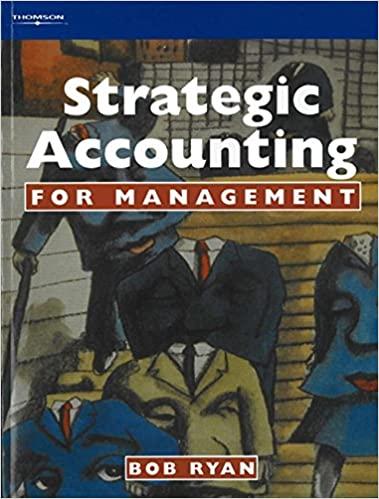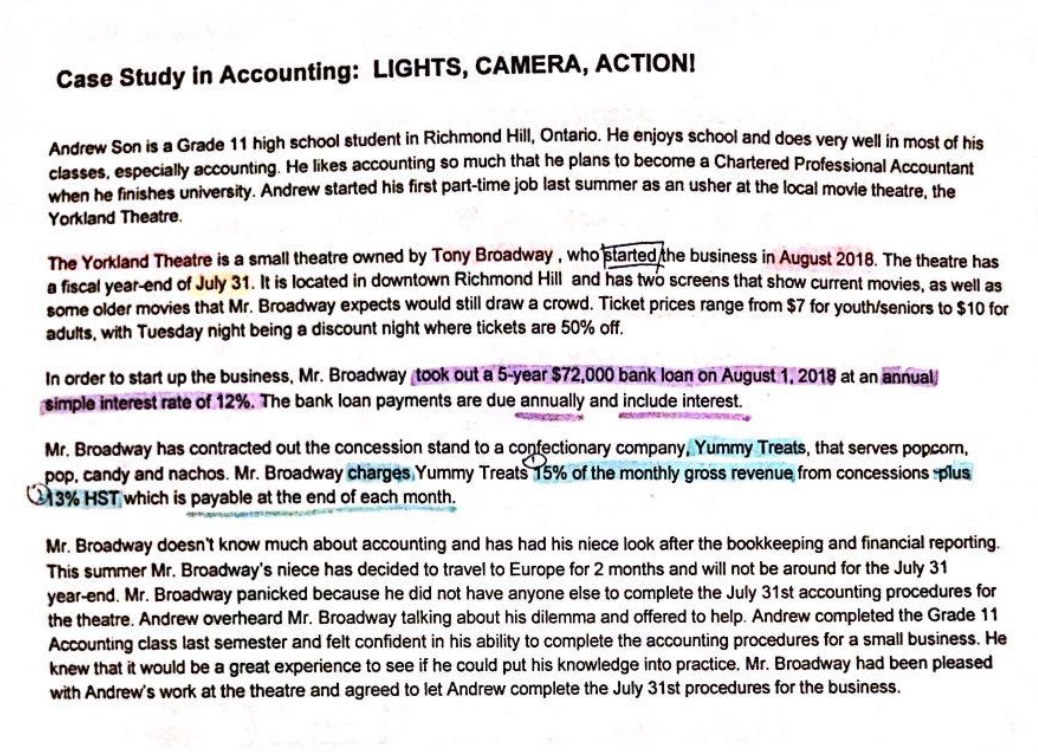
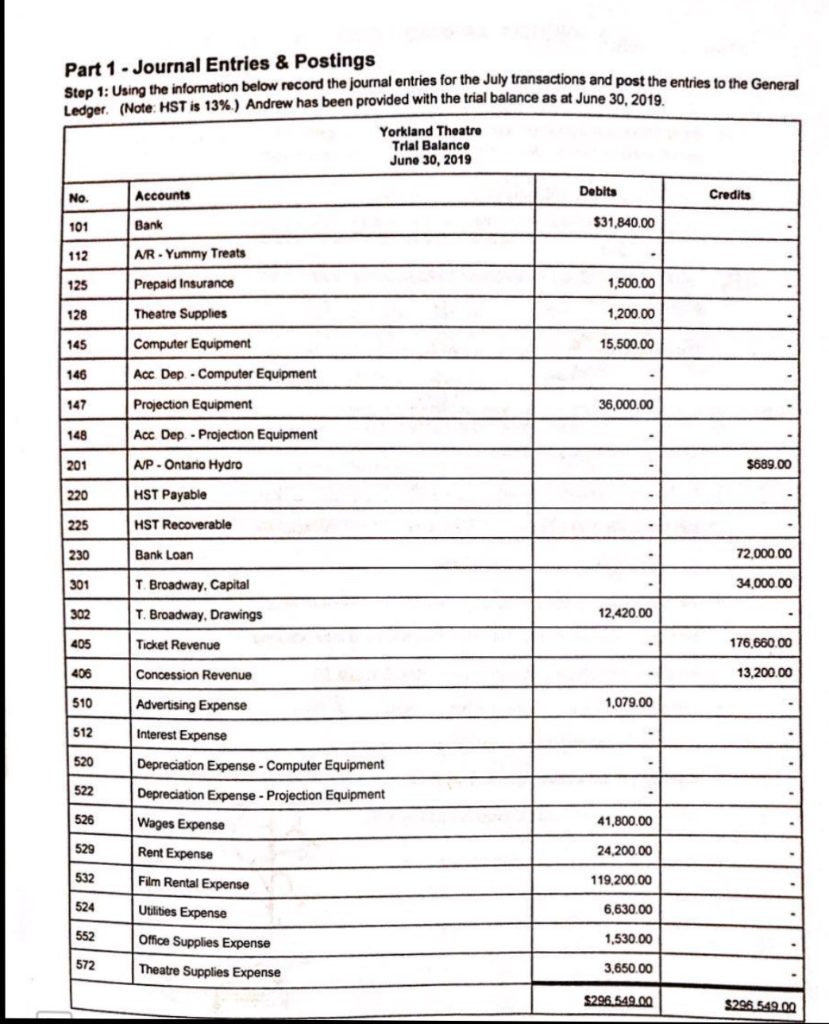
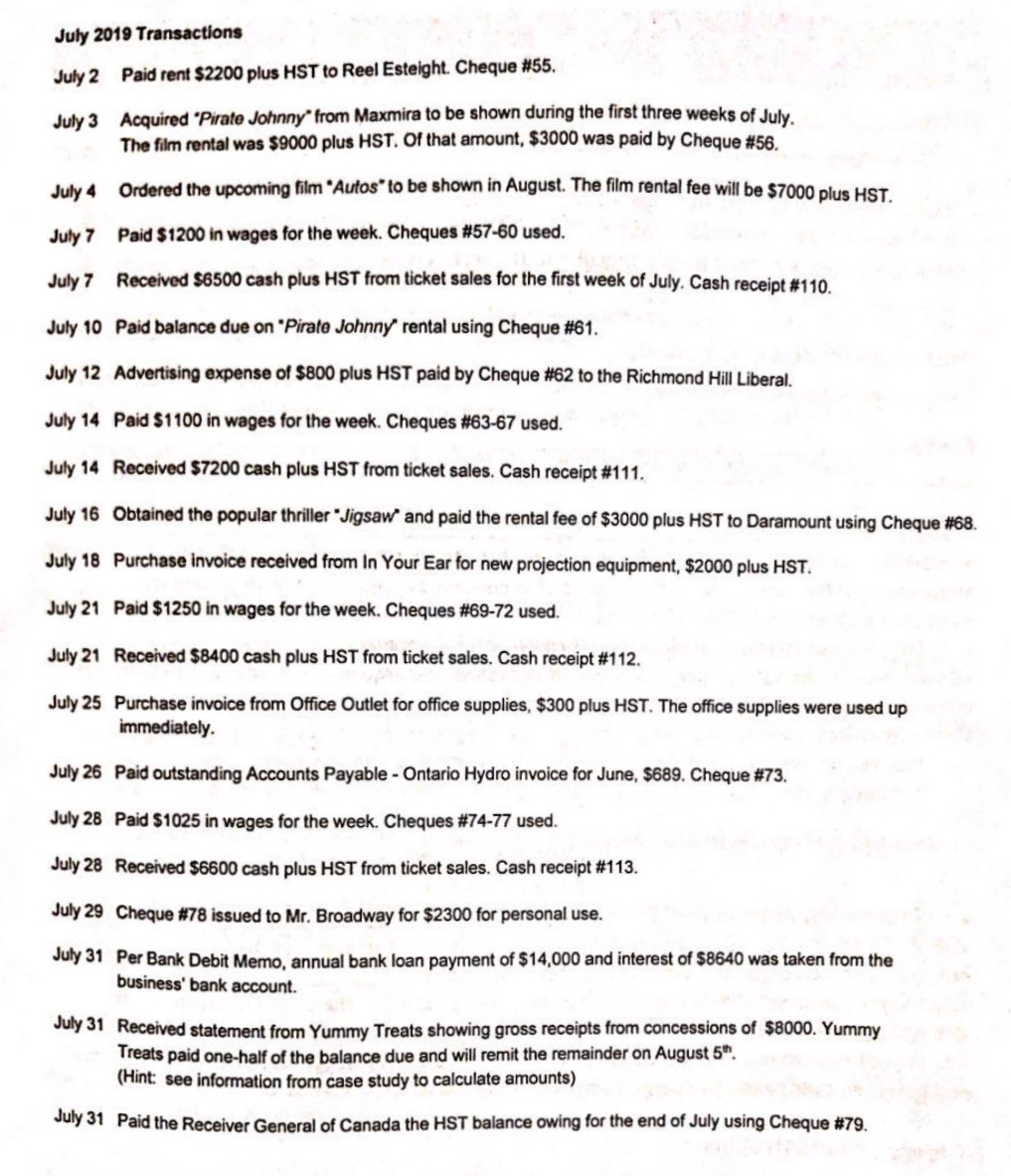
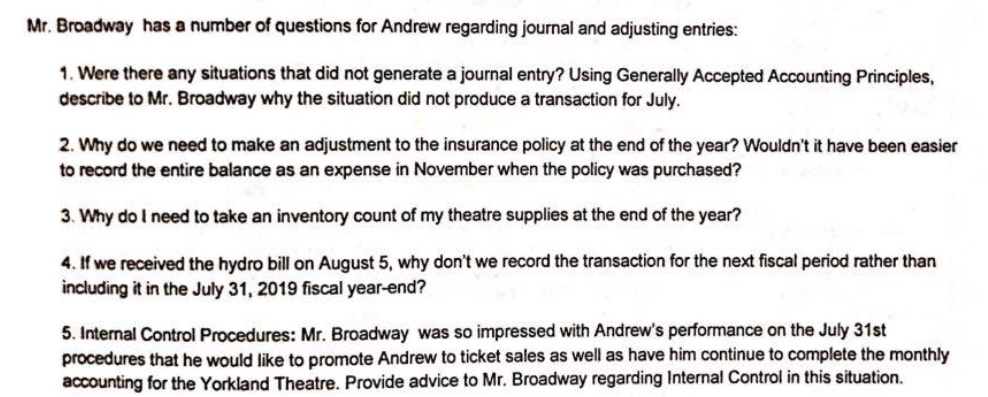 please answer the question1-5.
please answer the question1-5.
Case Study in Accounting: LIGHTS, CAMERA, ACTION! Andrew Son is a Grade 11 high school student in Richmond Hill, Ontario. He enjoys school and does very well in most of his classes, especially accounting. He likes accounting so much that he plans to become a Chartered Professional Accountant when he finishes university. Andrew started his first part-time job last summer as an usher at the local movie theatre, the Yorkland Theatre The Yorkland Theatre is a small theatre owned by Tony Broadway, who started the business in August 2018. The theatre has a fiscal year end of July 31. It is located in downtown Richmond Hill and has two screens that show current movies, as well as some older movies that Mr. Broadway expects would still draw a crowd. Ticket prices range from $7 for youth/seniors to $10 for adults, with Tuesday night being a discount night where tickets are 50% off. In order to start up the business, Mr. Broadway took out a 5-year $72,000 bank loan on August 1, 2018 at an annual simple interest rate of 12%. The bank loan payments are due annually and include interest. Mr. Broadway has contracted out the concession stand to a confectionary company, Yummy Treats, that serves popcorn, pop. candy and nachos. Mr. Broadway charges Yummy Treats 15% of the monthly gross revenue from concessions plus 13% HST which is payable at the end of each month. Mr. Broadway doesn't know much about accounting and has had his niece look after the bookkeeping and financial reporting. This summer Mr. Broadway's niece has decided to travel to Europe for 2 months and will not be around for the July 31 year-end. Mr. Broadway panicked because he did not have anyone else to complete the July 31st accounting procedures for the theatre. Andrew overheard Mr. Broadway talking about his dilemma and offered to help. Andrew completed the Grade 11 Accounting class last semester and felt confident in his ability to complete the accounting procedures for a small business. He knew that it would be a great experience to see if he could put his knowledge into practice. Mr. Broadway had been pleased with Andrew's work at the theatre and agreed to let Andrew complete the July 31st procedures for the business. Part 1 - Journal Entries & Postings Step 1: Using the information below record the journal entries for the July transactions and post the entries to the General Ledger. (Note: HST is 13%.) Andrew has been provided with the trial balance as at June 30, 2019. Yorkland Theatre Trial Balance June 30, 2019 No. Accounts Debits Credits 101 Bank $31,840.00 112 AR - Yummy Treats 125 Prepaid Insurance 1,500.00 128 Theatre Supplies 1,200.00 145 Computer Equipment 15,500.00 146 Acc Dep - Computer Equipment 147 Projection Equipment 36,000.00 148 Acc Dep. - Projection Equipment 201 AP - Ontano Hydro $689.00 220 HST Payable 225 HST Recoverable 230 Bank Loan 72,000.00 301 T Broadway, Capital 34,000.00 302 T. Broadway, Drawings 12,420.00 405 Ticket Revenue 176.660.00 406 Concession Revenue 13,200.00 510 Advertising Expense 1,079.00 512 Interest Expense 520 522 Depreciation Expense - Computer Equipment Depreciation Expense - Projection Equipment Wages Expense 526 41,800.00 529 Rent Expense 24,200.00 532 Film Rental Expense 119,200.00 524 Utilities Expense 6,630.00 552 1,530.00 Office Supplies Expense Theatre Supplies Expense 572 3.650.00 S296.549.00 $296.549.00 July 2019 Transactions July 2 Paid rent $2200 plus HST to Reel Esteight. Cheque #55. July 3 Acquired "Pirate Johnny" from Maxmira to be shown during the first three weeks of July. The film rental was $9000 plus HST. Of that amount, $3000 was paid by Cheque #56. July 4 Ordered the upcoming film 'Autos" to be shown in August. The film rental fee will be $7000 plus HST. July 7 Paid $1200 in wages for the week. Cheques #57-60 used. July 7 Received $6500 cash plus HST from ticket sales for the first week of July. Cash receipt #110. July 10 Paid balance due on "Pirate Johnny" rental using Cheque #61. July 12 Advertising expense of $800 plus HST paid by Cheque #62 to the Richmond Hill Liberal. July 14 Paid S1100 in wages for the week. Cheques #63-67 used. July 14 Received $7200 cash plus HST from ticket sales. Cash receipt #111. July 16 Obtained the popular thriller - Jigsaw and paid the rental fee of $3000 plus HST to Daramount using Cheque #68. July 18 Purchase invoice received from In Your Ear for new projection equipment, $2000 plus HST. July 21 Paid $1250 in wages for the week. Cheques #69-72 used. July 21 Received $8400 cash plus HST from ticket sales. Cash receipt #112. July 25 Purchase invoice from Office Outlet for office supplies, $300 plus HST. The office supplies were used up immediately. July 26 Paid outstanding Accounts Payable - Ontario Hydro invoice for June, $689. Cheque #73. July 28 Paid $1025 in wages for the week. Cheques #74-77 used. July 28 Received $6600 cash plus HST from ticket sales. Cash receipt #113. July 29 Cheque #78 issued to Mr. Broadway for $2300 for personal use. July 31 Per Bank Debit Memo, annual bank loan payment of $14,000 and interest of $8640 was taken from the business' bank account. July 31 Received statement from Yummy Treats showing gross receipts from concessions of $8000. Yummy Treats paid one-half of the balance due and will remit the remainder on August 5. (Hint: see information from case study to calculate amounts) July 31 Paid the Receiver General of Canada the HST balance owing for the end of July using Cheque #79. Mr. Broadway has a number of questions for Andrew regarding journal and adjusting entries: 1. Were there any situations that did not generate a journal entry? Using Generally Accepted Accounting Principles, describe to Mr. Broadway why the situation did not produce a transaction for July. 2. Why do we need to make an adjustment to the insurance policy at the end of the year? Wouldn't it have been easier to record the entire balance as an expense in November when the policy was purchased? 3. Why do I need to take an inventory count of my theatre supplies at the end of the year? 4. If we received the hydro bill on August 5, why don't we record the transaction for the next fiscal period rather than including it in the July 31, 2019 fiscal year-end? 5. Internal Control Procedures: Mr. Broadway was so impressed with Andrew's performance on the July 31st procedures that he would like to promote Andrew to ticket sales as well as have him continue to complete the monthly accounting for the Yorkland Theatre. Provide advice to Mr. Broadway regarding Internal Control in this situation



 please answer the question1-5.
please answer the question1-5.





